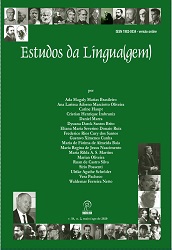O El alumno lector en el discurso de los documentos oficiales de enseñanza
DOI:
https://doi.org/10.22481/el.v18i2.5821Palabras clave:
Alumno lector; imaginario discursivo; documentos oficiales de enseñanza.Resumen
Este artículo tiene como objetivo presentar los resultados de una investigación acerca del imaginario discursivo sobre el alumno lector en algunos documentos oficiales de enseñanza - PCN (1998), OCEM (2006) y DCE / PR (2008) -, al trataren de las asignaturas de Lengua Portuguesa, Filosofía y Historia. Con el aporte teórico del análisis del discurso de matriz francesa, buscamos aprehender cuales imágenes de lector se construyen allí y cuales de sus efectos de sentido pueden impactar la enseñanza-aprendizaje de lectura. Los datos muestran que, en dichos documentos, la imagen de alumno lector está vinculada a la de profesor formador de lector, poniendo Lengua Portuguesa y Filosofía por un lado e Historia por el otro.
Descargas
Citas
BAKHTIN, M. Estética da criação verbal. Tradução de Maria Ermantina Galvão G. Pereira. 2. ed. São Paulo: Martins Fontes, 1997.
BRASIL. Lei de Diretrizes e Bases da Educação Nacional: Lei nº 9.394/96 – 24 de dez. 1996.
BRASIL. Secretaria de Educação Fundamental. Parâmetros curriculares nacionais: terceiro e quarto ciclo do ensino fundamental: língua portuguesa. Brasília: MEC/SEF, 1998a.
BRASIL. Secretaria de Educação Fundamental. Parâmetros curriculares nacionais: História. Brasília: MEC/SEF, 1998b.
BRASIL. Ministério da Educação. Secretaria de Educação Média e Tecnológica. Parâmetros Curriculares Nacionais: Ensino Médio, Ciências Humanas e suas Tecnologias, Brasília: MEC/SEF, 2000.
BRASIL. Orientações Curriculares para o Ensino Médio (OCEM). Vol. 1. Linguagens, códigos e suas tecnologias. Brasília: Ministério da Educação/Secretaria de Educação Básica, 2006a.
BRASIL. Orientações Curriculares para o Ensino Médio (OCEM). Vol. 3. Ciências Humanas e suas tecnologias. Brasília: Ministério da Educação/Secretaria de Educação Básica, 2006b.
CORACINI, M. J. R. F. A aula de línguas e as formas de silenciamento. In: CORACINI, M. J. R. F. (Org.). O jogo discursivo na aula de leitura: língua materna e língua estrangeira. 2. ed. Campinas: Pontes, 2002. p. 67-74.
FOUCAULT, M. A arqueologia do saber. Tradução de Luiz Felipe Baeta Neves. 7. ed. Rio de Janeiro: Forense Universitária, 2008.
GADET, F.; HAK, T. (Org). Por uma análise automática do discurso: uma introdução à obra de Michel Pêcheux. 2. ed. Campinas: Editora da Unicamp, 1993.
MARINHO, M. Currículos da escola brasileira: elementos para uma análise discursiva. In: Revista Portuguesa de Educação, Braga, v. 20, n. 1, 2007. p. 163-189. Disponível em: <www.scielo.mec.pt/pdf/rpe/v20n1/v20n1a07.pdf>. Acesso em: 29 set. 2016.
NASCIMENTO, Maria Regina de Jesuz. O imaginário discursivo sobre o aluno leitor no universo escolar. Orientadora: Eliana Maria Severino Donaio Ruiz. 2017. 112 f. Dissertação (Mestrado em Estudos da linguagem) Universidade Estadual de Londrina, Londrina, 2017.
ORLANDI, E. L. P. Análise do discurso: princípios e procedimentos. 7. ed. Campinas, SP: Pontes, 2007.
PARANÁ. Secretaria de Estado da educação. Diretrizes Curriculares da Educação Básica: Língua Portuguesa. Curitiba: [s.n.], 2008.
PÊCHEUX, M.; FUCHS, C. A propósito da Análise Automática do Discurso: atualização e perspectivas. In: GADET, F.; HAK, T. (org). Por uma análise automática do discurso: uma introdução à obra de Michel Pêcheux. 2. ed. Campinas: Editora da Unicamp, 1993. p.163-252. c1975.
PÊCHEUX, M. Análise automática do discurso (AAD-69). In: GADET, F.; HAK, T. (Org.). Por uma análise automática do discurso: uma introdução à obra de Michel Pêcheux. 4. ed. Campinas: Editora da Unicamp, 2010. p. 74 -87. c1993.
PÊCHEUX, M. Semântica e Discurso: uma crítica à afirmação do óbvio. Tradução de Eni Orlandi et al. 2. ed. Campinas: Editora da Unicamp, 1975.
Descargas
Publicado
Cómo citar
Número
Sección
Licencia

Estudos da Língua(gem) está bajo una Licencia Creative Commons Atribución 4.0 Internacional.
Los autores que publican en el periódico Estudios de la Lengua (g) concuerdan con los siguientes términos:
La revista Estudios del Lenguaje mantiene los derechos de autor de las contribuciones publicadas. Estos derechos incluyen la publicación de la contribución y pondrá a disposición su contenido gratuitamente a través del portal







